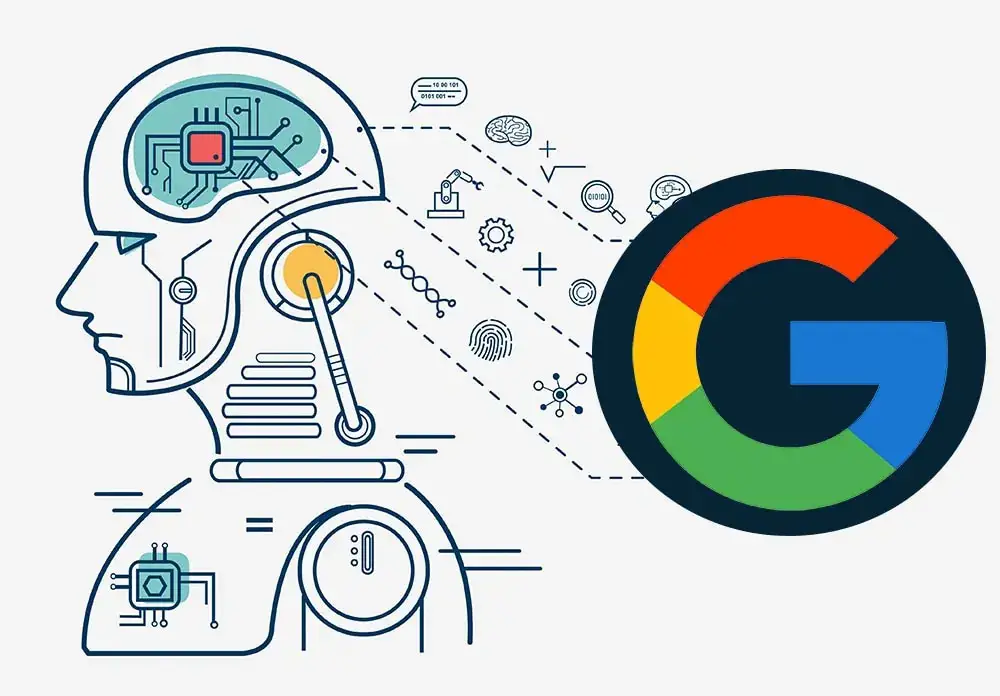
How The June Google Core Update Impacted Digital Publishers (2019)

Get helpful updates in your inbox
How The June Google Core Update Impacted Digital Publishers (2019)
Google has made a regular practice of announcing “core” search algorithm updates several times a year. Philosophically, Google’s webmaster team has strayed from naming or discussing details around what these “core” updates specifically impact. The June 2019 Google Core Update was no exception. The only difference in communication regarding this search algorithm update was that Google announced the pending update 24 hours ahead of time on Twitter.
Tomorrow, we are releasing a broad core algorithm update, as we do several times per year. It is called the June 2019 Core Update. Our guidance about such updates remains as we’ve covered before. Please see this tweet for more about that:https://t.co/tmfQkhdjPL
— Google SearchLiaison (@searchliaison) June 2, 2019
Below, I’ll highlight how the recent June 2019 Google search algorithm update impacted digital publishers.
- How did digital publishers fare in this recent update?
- What types of publishers were impacted the most (positively and negatively)?
- What did sites that saw traffic increases have in common?
- What attributes might be important to work on if you were negatively impacted by this update?
Tell me about the data: The data and information below includes records from over 5,000 digital publishers that generate the majority of their website traffic from Google’s search engines. It includes a mix of publishers, from small blogs to major media brands. We also adjusted for seasonality during this timeframe and eliminated outliers. Our timeframe included 10 days just prior to the update and 10 days after starting on June 4th; as this is when most sites seem to have started seeing the impact of the algorithm changes (we looked at the same days of the week in both periods).
What was the June 2019 Google Core Update?
Google core algorithm updates often lead to mass, industry-wide speculation about the nature of Google’s ambiguous statements regarding what the updates are actually affecting. Generally, these updates include a multitude of changes in how Google ranks and indexes search results. This makes it extremely difficult for webmasters to understand if they are generally keeping their sites aligned with SEO best practices.
In the case of the June 2019 update, Google announced that it also modified its search results to include a “diversity update” that would help eliminate duplicate results for the same site more than twice for most search queries. This was in addition to the core update — which Google considers separate.
This site diversity change means that you usually won’t see more than two listings from the same site in our top results. However, we may still show more than two in cases where our systems determine it’s especially relevant to do so for a particular search….
— Google SearchLiaison (@searchliaison) June 6, 2019
This only further complicated how webmasters were able to ultimately determine what exactly might have caused their websites to be positively or negatively impacted by the June 2019 core update (although our friends at Moz seem to believe the diversity update had almost no impact on actual search result diversity).
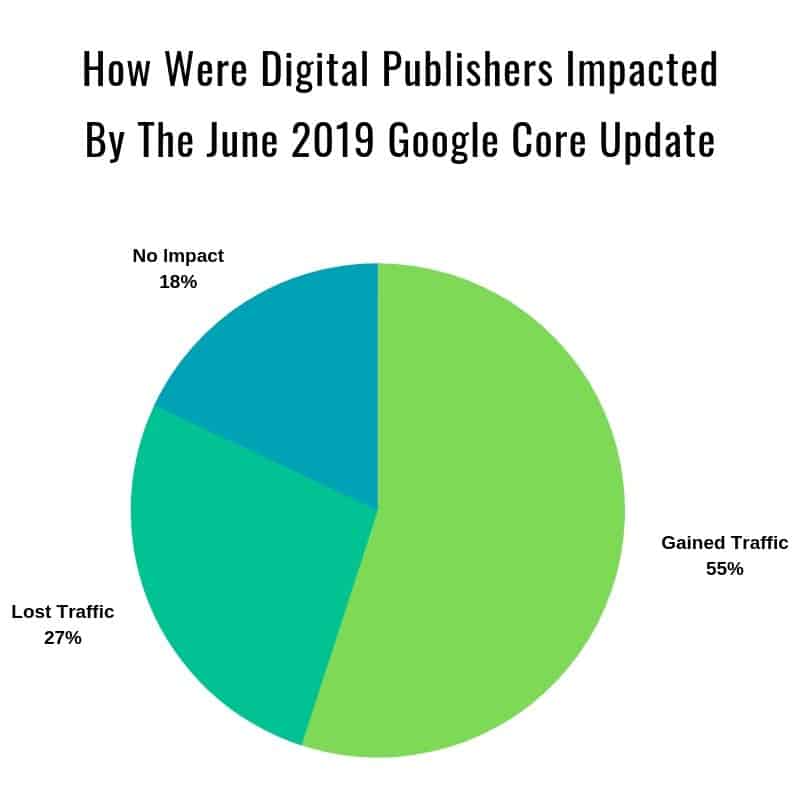
How were publishers affected by the June algorithm update?
As a whole, digital publishers seemed to come out slightly ahead on this update. 55% of all the publishers we observed saw some kind of non-seasonal increase in organic pageviews starting on June 4th.
That leaves 45% of publishers that no impact or a net negative impact overall. Only 27% actually saw a measurable decline in organic traffic.
Fortunately, we saw a positive impact on the overall amount of organic traffic that Google was sending to digital publishers. This is a bit of good news for publishers that may have recently seen the data regarding the overall amount of no-click searches and non-organic clicks that come from all the queries in Google search results.
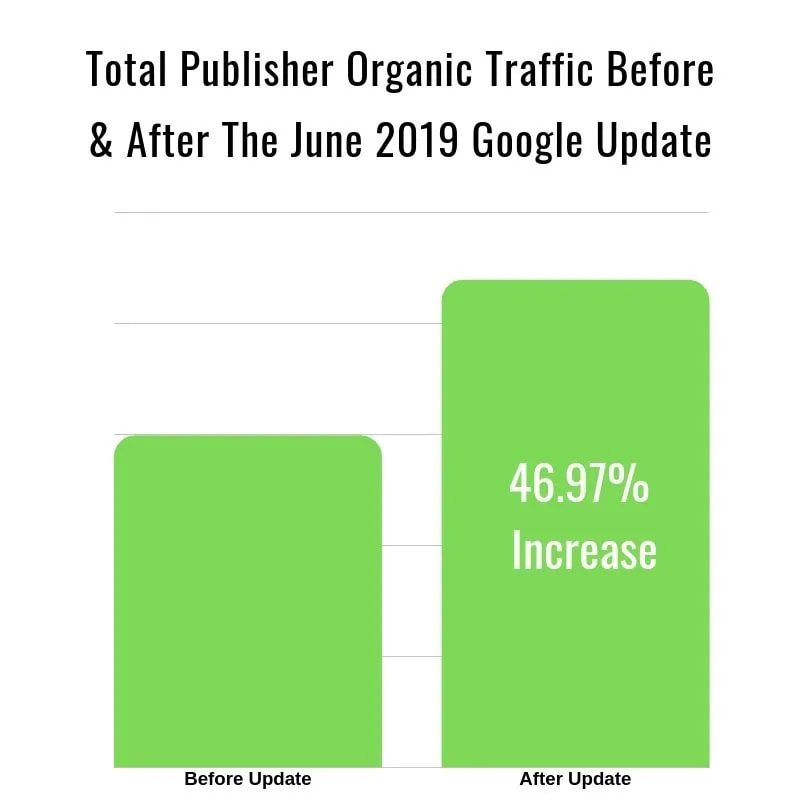
Why did websites lose traffic after the June 2019 Google update?
Looking at only digital publishers, we were able to detect a few common features of websites that lost traffic vs. the ones that gained traffic.
To get a better idea of what elements might have been most important, we compared the sites that lost the most amount of traffic vs. the sites the benefited the most from the update on June 3rd.
By no means is this a comprehensive list of all the things these sites may or may not have had in common. We simply decided to look at currently popular or often discussed attributes that were objectively observable to compare and contrast the biggest “winners” and “losers” of the June Google update.
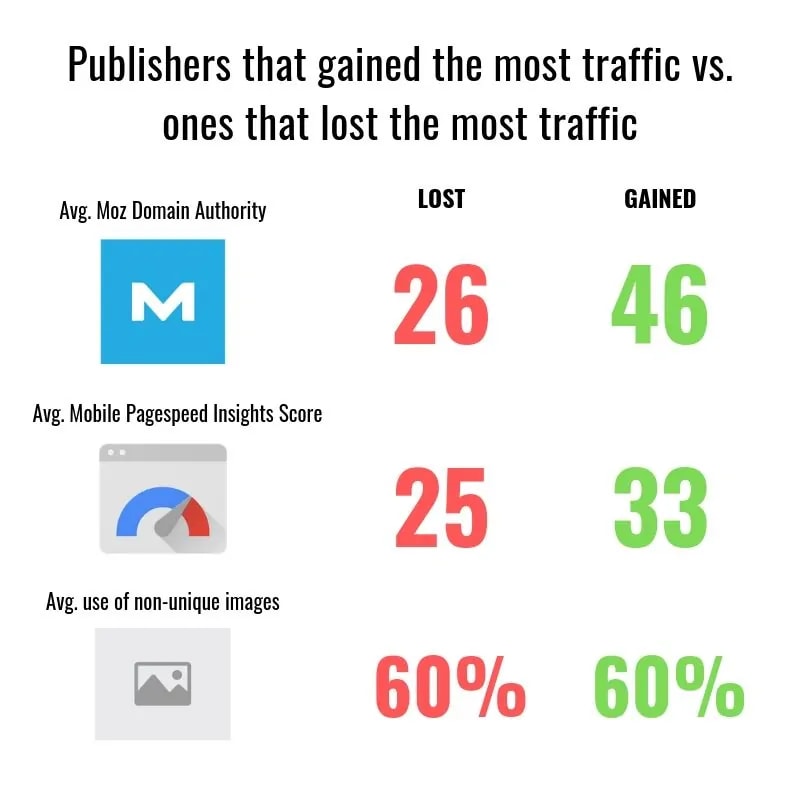
Domain authority is something we have talked about before. While ultimately Moz’s domain authority isn’t representative of any actual metric or score from Google itself (and is not a ranking factor), it does create a composite understanding of how many experts believe Google might weight the authority or trust of certain domains.
We’ve looked closer at domain authority over time and why it may not be as important as many think that it is for growing a new website; however, as we dug deeper into the types of sites that saw the biggest losses in traffic, we started to see why domain authority might have been correlated. The specific sites that were affected were commonly in categories that included queries that Google may believe need a higher level of authority to ensure satisfactory results (more on this below).
Additionally, given the hysteria about pagespeed in the past year, we decided to see how pagespeed might have been correlated with the overall impact of the sites that saw traffic losses vs. the ones that saw traffic gains.
When looking at all the sites that lost traffic vs. all the sites that gained traffic, we saw almost no difference in the average mobile Pagespeed Insights Score (Google’s pagespeed testing tool for webmasters).
When we only looked at the groups with the biggest gains vs. the biggest losses in traffic, we saw that there was only a slight difference in their overall PageSpeed Insights Scores. There was a 32% higher score on the sites with the best results during the update.
Here are a few resources for improving mobile website speed.
- How to speed up a WordPress website
- A list of actionable articles on website speed and mobile infrastructure
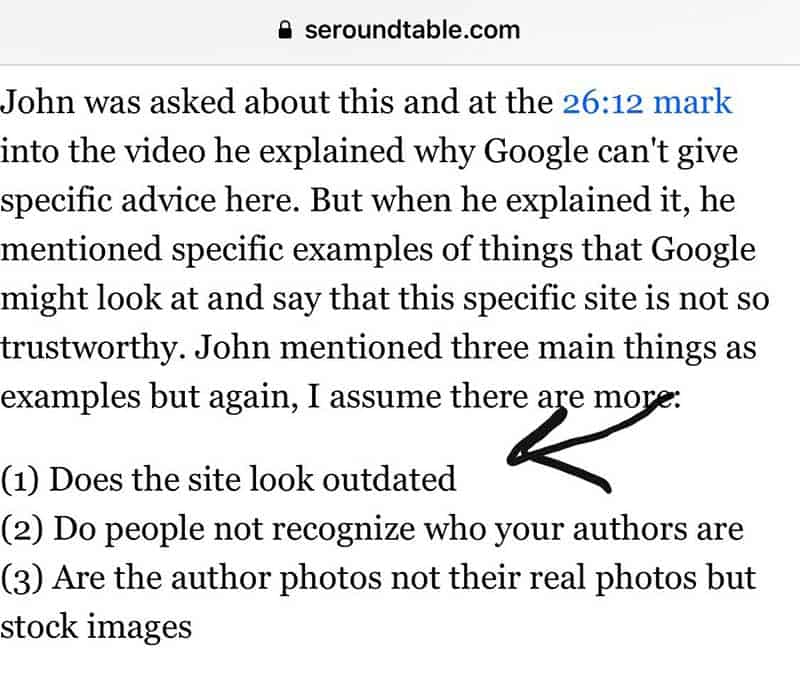
Lastly, we decided to take a peek at stock image use. This seemed like a weird thing to look at, but it was specifically mentioned by Google webmaster team member, John Mueller, during a recent Google webmaster chat. He sort of mentioned off the cuff that sites with outdated content or lots of stock photos may have been impacted because of these elements.
While outdated content is a bit subjective and hard to measure across thousands of sites, we could look closely at the use of non-unique images. When looking at the sites with the most dramatic traffic declines, we couldn’t see any differences in the use of unique images between them as a whole and the websites with the biggest traffic gains.
This could differ by niche, category, or publisher but it is not a mass trend we found in the data.
What types of sites were impacted the most by the June Google core update?
While our sampling of publishers isn’t indicative of the entire web, there were some themes we could pick out among the websites that benefitted the most during the update vs. those that had the largest losses.
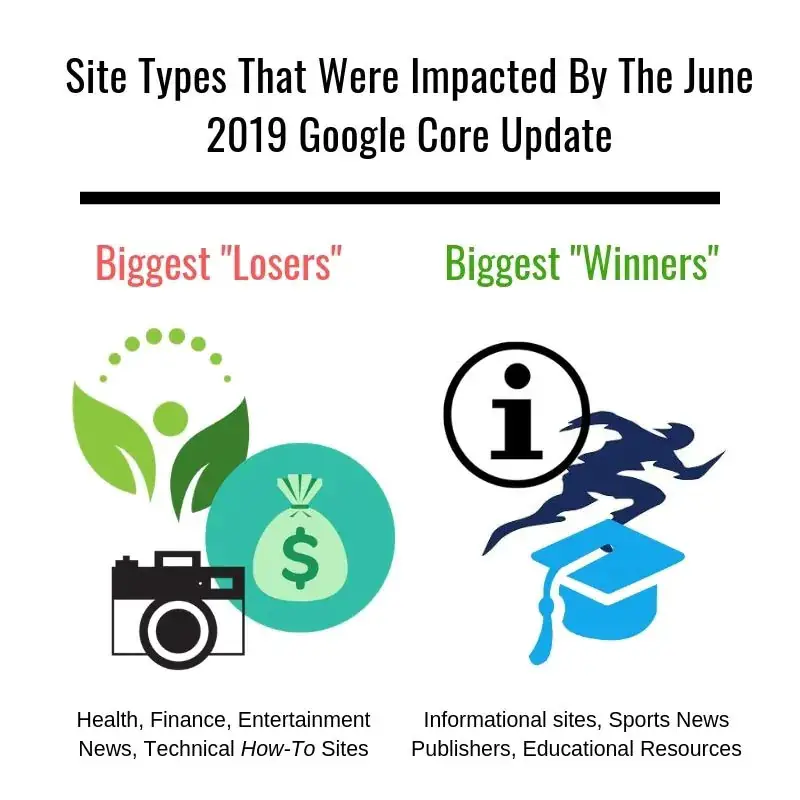
Some of this might not come as a big surprise to publishers that have been recently following the Google core updates from the last few years. Last year, the Google core update in March was infamously called the Medic Update because of the specific impact that many health and wellness sites initially reported.
Google has made it clear in of its search quality rater guidelines that they are continuing to take a specific interest in appropriately ranking sites that affect “Your Money or Your Life” (referred to commonly as YMYL). Google’s criteria for this broadly centers around a concept of expertise, authority, and trustworthiness (EAT). We’ll touch on that in a more technical manner in another upcoming blog.
These YMYL sites can be broadly categorized into niches that advise people on health, finance, and other topics that require expert knowledge in order to make an informed opinion about something that could impact a person’s total well-being.
With this in mind, it’s not a big surprise that a low domain authority score was correlated with these specific types of sites seeing the most dramatic losses in traffic after the June 2019 update.
What else might be a factor in Google’s June update?
Universally, it is very hard to pick apart factors that we could say with strong confidence definitely impacted, or didn’t impact, digital publishers in this study.
One of the common themes we’ve heard is that many publishers believed that this recent update “corrected” their positive or negative results from previous Google core updates.
Our data was not able to conclude that this was the case.
Looking at multiple sites from past studies, there didn’t seem to be any trends that we noticed between sites that lost or gained traffic in previous updates and this recent June 2019 update. There are examples of just about every scenario.
However…
Here are other things we observed among some sites that lost traffic vs. sites that gained traffic:
- Sites that did not regularly produce new content were affected more negatively than sites that published new content frequently.
- Non-English language sites were affected more negatively than English language sites.
- Sites that were negatively impacted the most included affiliate links on every page.
- Sites that saw large increases in traffic rarely included affiliate links on every page.
- Mobile traffic was affected for all publishers more than desktop traffic.
Note: If you do use affiliate links on your site, be sure to change your affiliate links to rel=sponsored like Google wants before March 1, 2020
Summarizing the data on the 2019 Google Core Update
It is important that publishers who are negatively impacted by these Google core updates realize that these are not penalties. Google does manually penalize sites for violating webmaster guidelines but is transparent in sharing this with webmasters. Inside Search Console, publishers can observe any manual penalties against their site.
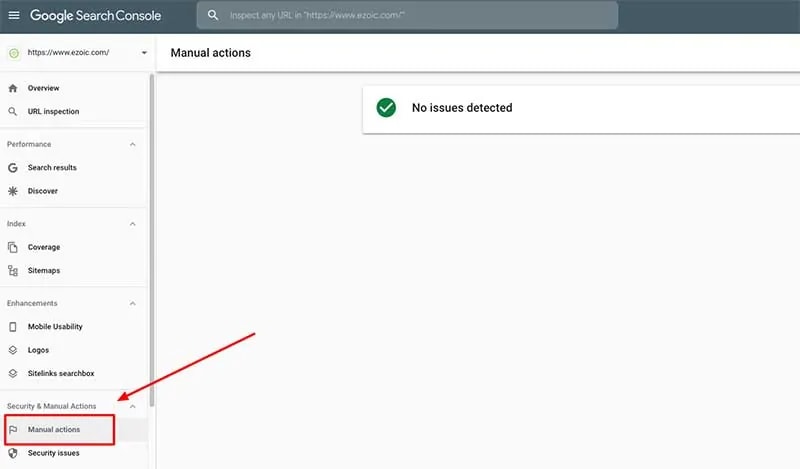
These core updates can often feel like a penalty due to the negative impact that many publishers see in their traffic. This is especially true for sites that feel as if they have followed SEO best practices and listened to Google’s advice in the past.
One of the best pieces of advice I can give to webmasters wrestling with this sentiment is that you should avoid advice that suggests there is “one thing” or a particular strategy that will ensure your site “recovers” from this update. Recovery insinuates that your site was targeted for doing something wrong that is fixable. This is often not the case. Even when it is, it is unlikely one thing.
These Google core updates include a lot of factors. Many of them are fundamentally unchangeable and therefore nothing that can be corrected by webmasters.
For example, if domain age happens to be a more heavily weighted ranking factor in your category, or for your top queries, there is nothing you can do to make your domain older.
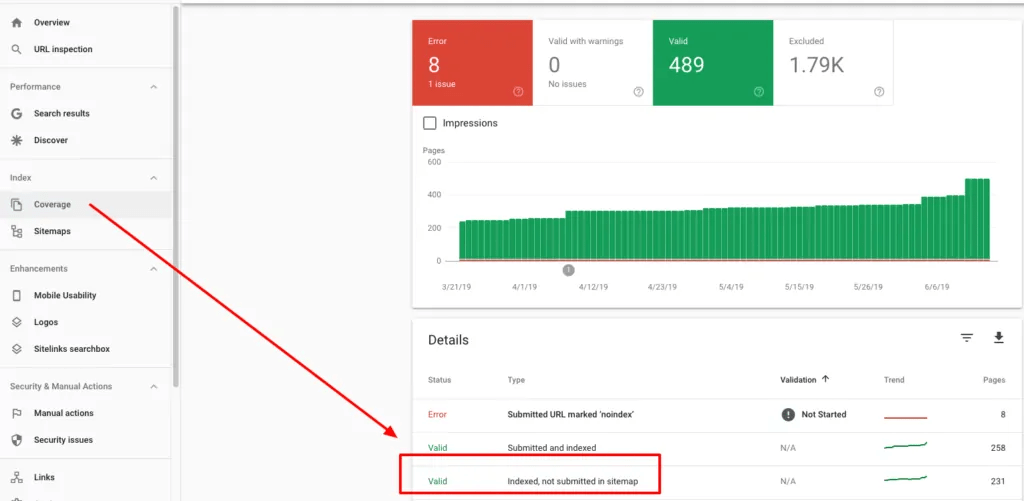
If you were negatively impacted by this update, my advice would be to focus on the general infrastructure of your site and freshness of your content. Here is my checklist based on the data I’ve seen so far on sites that were hurt by this update:
- Ensure that your top landing pages for organic traffic prior to the update include freshly updated content.
- If you are in a “YMYL” category, consider adding citations in the form of follow links to credible resources (.gov or .edu sources are the best).
- Make sure your sitemap truly represents your website, and use Search Console to verify it can actually crawl the URLs you’ve submitted. Many 3rd party sitemap providers produce poor sitemaps.
In summary, make your website relevant, credible, and crawlable. Often, this advice is given in a very subjective format. The three tips above are specific actions that offer a real objective benefit if they are implemented.
Questions about the recent update? I’ll do my best to answer them in the comments section.

Tyler is an award-winning digital marketer, founder of Pubtelligence, CMO of Ezoic, SEO speaker, successful start-up founder, and well-known publishing industry personality.
Featured Content
Checkout this popular and trending content

Ranking In Universal Search Results: Video Is The Secret
See how Flickify can become the ultimate SEO hack for sites missing out on rankings because of a lack of video.
Announcement

Ezoic Edge: The Fastest Way To Load Pages. Period.
Ezoic announces an industry-first edge content delivery network for websites and creators; bringing the fastest pages on the web to Ezoic publishers.
Launch

Ezoic Unveils New Enterprise Program: Empowering Creators to Scale and Succeed
Ezoic recently announced a higher level designed for publishers that have reached that ultimate stage of growth. See what it means for Ezoic users.
Announcement
